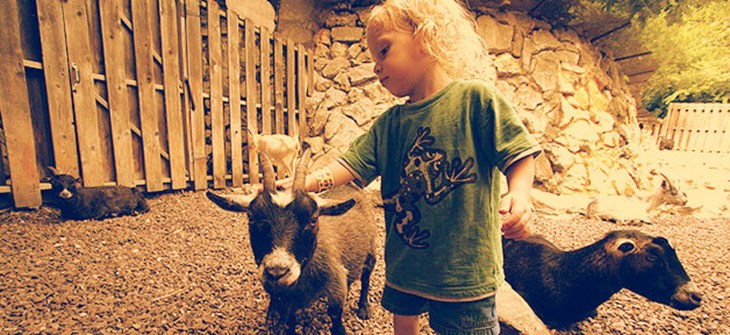Published 27/11/2013

When it comes to kick-starting a food revolution, children are one of our greatest hopes; what they learn today will shape the food systems of tomorrow. Here’s a rundown of some of the best and worst edible educations out there.
If we are to feed our ever-hungry population without harming people, animals and the planet, then the consumers, farmers, entrepreneurs and policy-makers of tomorrow must understand how their food gets from farm to fork.
So what’s being done to improve this understanding? And is the information we’re feeding kids a help or a hindrance in the fight for better food? We take a look below, showcasing both the sublime and the ridiculous.
From Facebook to the farmyard
Thanks to initiatives such as Garden Organic’s Growing Food in Schools Taskforce and the Growing Schools initiative, more and more children are connecting with their food. In the UK, it’s common for primary schools to have window boxes, veg patches and allotments to grow vegetables, or even small farms to raise free-range chickens and pigs. Many teachers also use fantastic food and farming resources to enhance this kind of edible education.
Hands-on, outdoorsy learning can instil a deep-rooted respect for nature at a formative age, as well as offer a valuable source of exercise and fresh air for the generation that probably feels more at home on Facebook than in the farmyard.
Breaking down barriers
With Horticulture on the National Curriculum from 2014, schools are taking further steps to bring children closer to nature. A current trend is the use of glass domes as classrooms. Filled with natural light, these innovative spaces are helping to break down the inside-outside barrier.
In a similar way, the urban-country divide is closing up with the success of city farms. Even in urban environments, it’s increasingly easy for kids to get up close and personal with farm animals (in London alone, there are nearly 20 city farms).
A load of hogwash!
And then comes the sort of educational contribution that flies in the face of progress by misleading kids about their food. We’re talking about a US colouring book called Producers, Pigs & Pork, which distorts the horrific realities of factory farming. Forget crayons and creativity, and think big-ag propaganda instead.
Kids can colour in a smiling farmer, vet and boy called Billy, as well as healthy-looking pigs, towering feeding silos and endless windowless barns. Billy is told that intensive systems benefit the environment, that "pig barns don’t have any mud...so the pigs stay healthy and happy", and that meat produced this way is "safe, healthy and delicious". What a load of hogwash!
We all know the horrific realities of factory farming couldn’t be further from the idyllic picture being painted here.
A growing trend
It’s hard to believe that kids are being exposed to publications like Producers, Pigs & Pork, which perpetuate industry-invented food-production myths. The kids who colour in those squeaky-clean barns and happy-looking, incarcerated pigs may well be the ones buying factory-farmed meat as adults.
But the book is just one bad apple in what seems to be a large and growing body of edible-education goodness. In the fight for better food, ensuring the younger generation receives a rounded, honest education has to be one of the greatest investments society can make.
